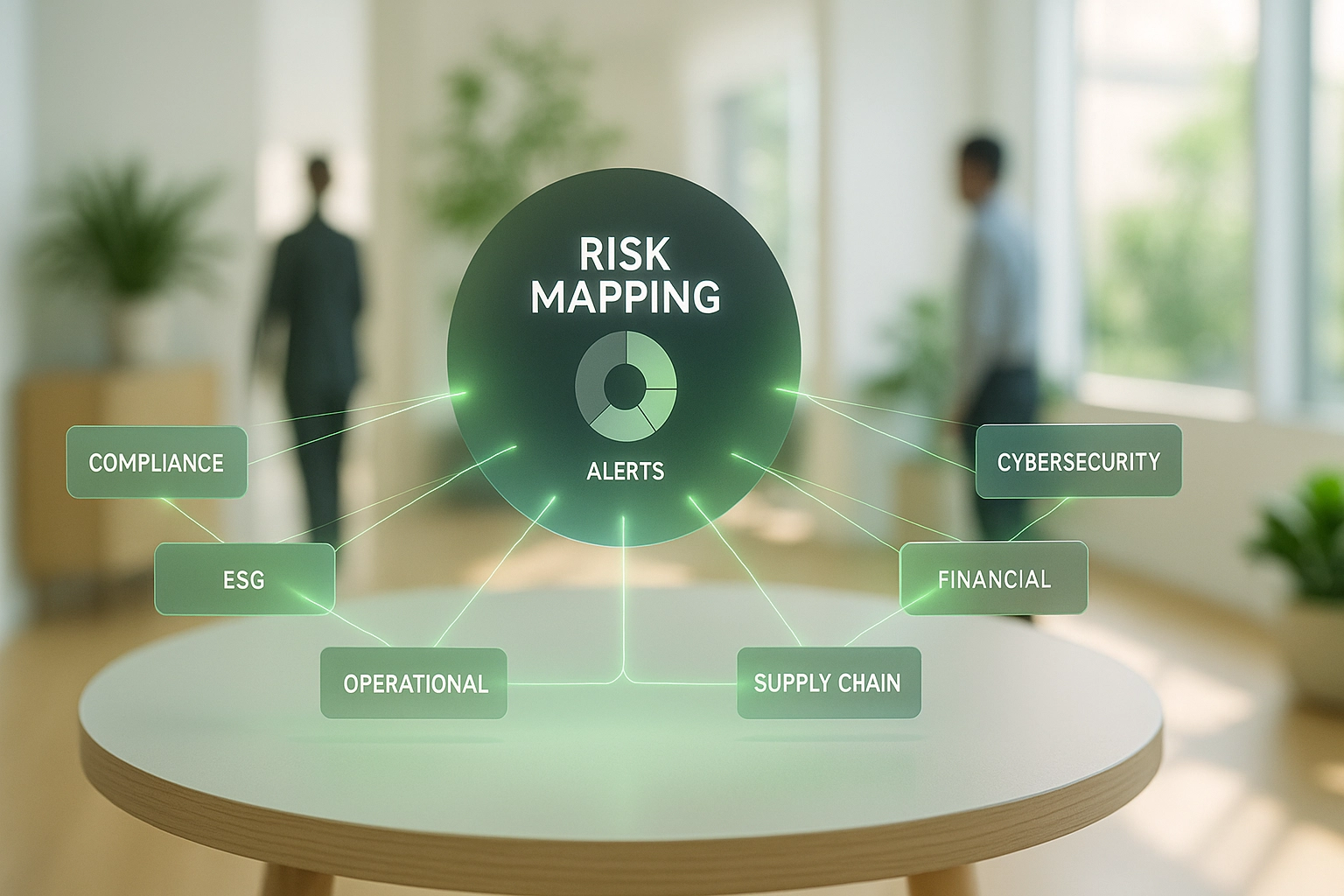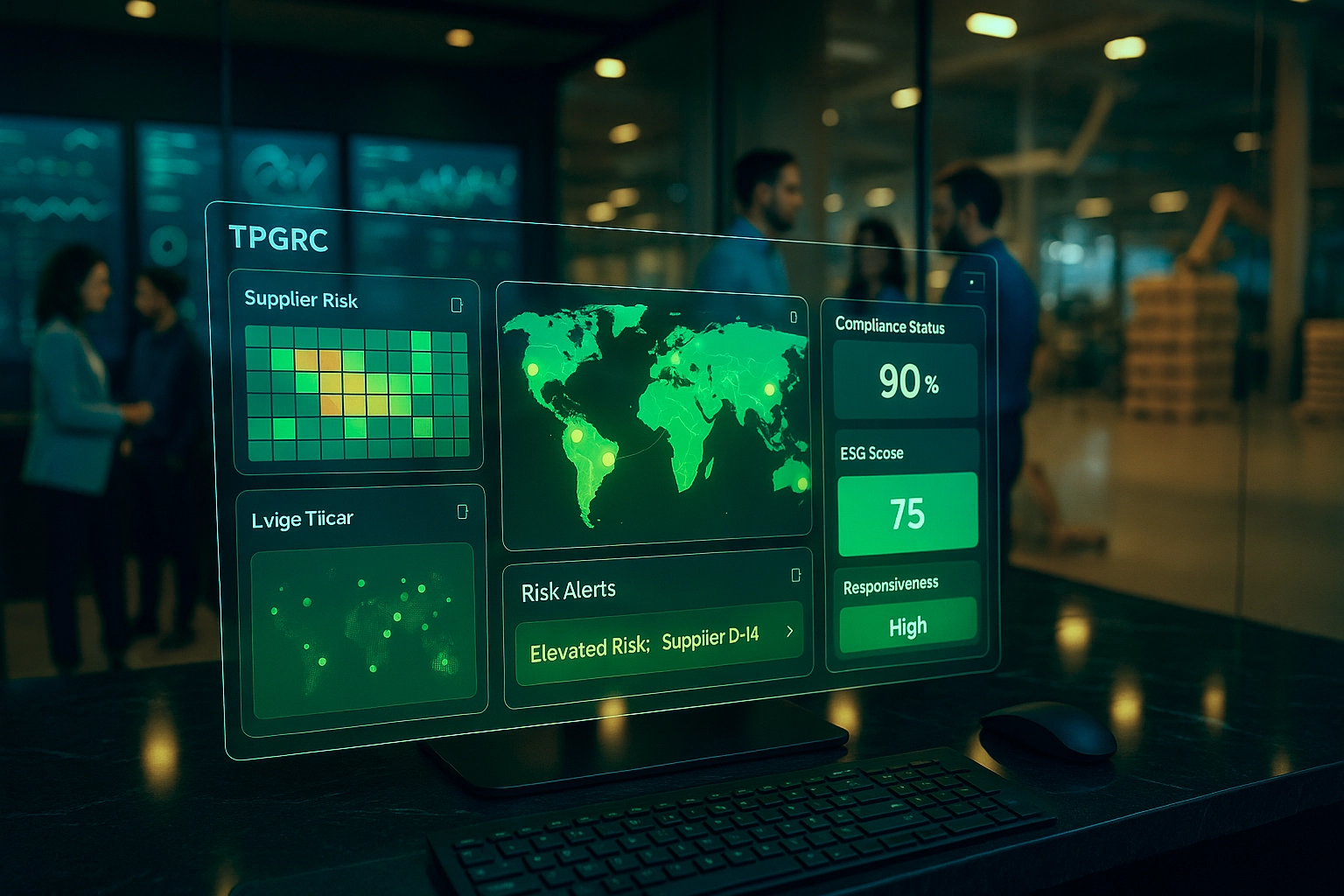Supplier Cybersecurity Assessment: Key Criteria and ISO Expertise

In 2024, cyberattacks have reached a critical level with a projected global cost of $9.5 trillion. The recent Change Healthcare breach, compromising the data of 190 million people, perfectly illustrates the catastrophic risks tied to the supply chain.
Faced with this threat, where a new attack occurs every 11 seconds, rigorous supplier cybersecurity assessment has become a strategic pillar of third-party risk management. This structured approach, based on international standards, enables companies to secure their supply chain while meeting growing regulatory demands.
Data protection and business continuity now require a structured approach to partner security, with the average cost per incident reaching $4.88 million.
Key Criteria for an Effective Assessment
Cybersecurity Audit
Assessing maturity level and performing a cybersecurity audit forms the foundation of supplier evaluation. Beyond a simple check, it’s a thorough analysis based on precise criteria.
Protection Measures
- Security infrastructure and access controls
- Protection of sensitive and confidential data
- Securing cloud environments
Incident Management
- Documented incident response procedures
- Dedicated cybersecurity team
- Regularly tested business continuity plans
Compliance and Certifications
- ISO 27001/27701 compliance
- Alignment with GDPR requirements
- Ongoing updates to security protocols
The audit provides a detailed view of the supplier’s security status and flags key risk areas.
Certifications and Compliance
Holding recognized certifications such as ISO 27001 is a strong signal of supplier reliability. These attest to compliance with international information security management standards. Beyond ISO 27001, some companies may require ISO 27701, which adds a data privacy dimension. Both should be part of document collection.
Compliance with local and international regulations, like the European GDPR, is also essential. A compliant supplier reduces financial and legal risks, ensuring better overall security.
Cybersecurity Maturity
Evaluating a supplier’s cybersecurity maturity means understanding how deeply security practices are embedded in their operations. Key indicators include:
- Existence of a dedicated cybersecurity team
- Regular employee training
- Implementation of strong security policies
The more mature a supplier is, the lower the risk for your company.
Managing Supplier Risk
Risk Scoring
Managing supplier-related risk requires a holistic approach that incorporates cybersecurity and business continuity. Total supply chain attack costs are projected to reach USD 60 billion in 2025, reinforcing the need for robust strategies.
Risk Categories to Assess
- Financial and operational risks
- Security and compliance risks
- Reputational and strategic risks
Access Controls
Enforcing strict access controls is critical:
- Least privilege principle
- Multi-factor authentication (MFA)
- Network segmentation of access rights
Risk management requires evaluating both the probability of an attack and its potential consequences to prioritize resources and define targeted action plans.
Business Continuity
To ensure viable partnerships, business continuity must be maintained even during cyberattacks. Suppliers should demonstrate robust disaster recovery plans and response capabilities:
- IT backup and data recovery plans
- Regular plan testing
- Ability to promptly inform clients during incidents
These mechanisms help minimize impact and restore normal operations swiftly.
Aprovall’s ISO 27001/27701 Expertise
Why Choose Aprovall?
Aprovall stands out with its expertise in ISO 27001 and 27701, demonstrated by over 200 successful certifications in 2024.
Success Stories
- ISO 27001 certification obtained in 3 months for a retail leader (see our client testimonials)
- Accelerated GDPR compliance for 15 critical suppliers
- 40% reduction in post-certification security incidents
Compliance Support
Some suppliers may need guidance to achieve ISO compliance. Aprovall offers pre-certification audits to identify gaps and define a clear improvement roadmap.
Practical Support
- Maturity audit within 48h
- 5-step custom action plan
- Dedicated support throughout the process
Improving cybersecurity maturity through expert support enhances not only supplier security but also your organization’s overall security posture.
Evangelizing Security Best Practices
Awareness and Training
Beyond implementing best practices, continuous awareness is key to maintaining high security standards. Aprovall plays a crucial role in training and educating suppliers on cybersecurity importance. Through workshops and training sessions, they help businesses remain alert to evolving threats.
These awareness initiatives aim to build a security-first culture within organizations. Only by integrating cybersecurity into daily operations can businesses withstand increasingly sophisticated attacks.
Promoting Industry Best Practices
Promoting sector best practices is a cornerstone of Aprovall’s approach. By sharing case studies and client experiences, the company helps raise the security standards across the entire value chain. This knowledge-sharing community ensures all members benefit from collective progress.
Adopting best practices often requires collaboration. Aprovall fosters cooperation between stakeholders to collectively raise cybersecurity maturity levels across industries.
Conclusion
Supplier cybersecurity assessment is now a strategic imperative for every business. In a world where cyberattacks occur every 11 seconds, protecting your supply chain is critical.
Immediate Action Points
- Conduct an initial audit of your critical suppliers
- Implement continuous monitoring
- Establish a structured ISO certification program
Supported by Aprovall’s ISO 27001/27701 expertise, this evaluation approach not only secures your ecosystem but also anticipates future threats. In a world of increasingly sophisticated attacks, a proactive stance is your best protection.
Our experts are here to help build your cybersecurity strategy together.
These articles might interest you
-
 16 May 2025Why Assessing Upstream Suppliers Is EssentialSolutionsUpper-Tier Suppliers: The (Too Often) Overlooked Risk in Your Supply Chain Modern procurement chains rely on a multitude of actors, each contributing to value creation—extraction, manufacturing, assembly… The final product is never the result of a single supplier but rather the outcome of an often international ecosystem. Yet, most organizations still focus their efforts and […]
16 May 2025Why Assessing Upstream Suppliers Is EssentialSolutionsUpper-Tier Suppliers: The (Too Often) Overlooked Risk in Your Supply Chain Modern procurement chains rely on a multitude of actors, each contributing to value creation—extraction, manufacturing, assembly… The final product is never the result of a single supplier but rather the outcome of an often international ecosystem. Yet, most organizations still focus their efforts and […]Read more
-
 18 July 2025Why Connecting Your Risk Mapping to TPRM Is a Game ChangerSolutionsIn a context where third-party ecosystems are expanding, organizations can no longer afford to manage their vendor relationships blindly. Companies are now selecting partners based on increasingly specific criteria, and many have implemented risk mapping tools to gain a clearer view of the risks posed by their subcontractors. They must actively manage third-party risks. According […]
18 July 2025Why Connecting Your Risk Mapping to TPRM Is a Game ChangerSolutionsIn a context where third-party ecosystems are expanding, organizations can no longer afford to manage their vendor relationships blindly. Companies are now selecting partners based on increasingly specific criteria, and many have implemented risk mapping tools to gain a clearer view of the risks posed by their subcontractors. They must actively manage third-party risks. According […]Read more
-
 05 March 2025Maximizing the Impact of Dynamic Risk Scoring: Monitoring and Personalization for Effective Third-Party Risk ManagementSolutionsIn our previous article, we explored the fundamentals of dynamic risk scoring and its essential role in evolving third-party governance practices. This innovative approach, leveraging real-time data and sophisticated analytical models, is profoundly transforming the way organizations assess their third-party partners. As European regulatory requirements tighten with DORA, NIS 2, and the convergence of CSRD/Duty of Vigilance, organizations must […]
05 March 2025Maximizing the Impact of Dynamic Risk Scoring: Monitoring and Personalization for Effective Third-Party Risk ManagementSolutionsIn our previous article, we explored the fundamentals of dynamic risk scoring and its essential role in evolving third-party governance practices. This innovative approach, leveraging real-time data and sophisticated analytical models, is profoundly transforming the way organizations assess their third-party partners. As European regulatory requirements tighten with DORA, NIS 2, and the convergence of CSRD/Duty of Vigilance, organizations must […]Read more
-
 17 March 2025Optimize Your Supply Chain Monitoring with Dynamic and Customizable TPGRC DashboardsSolutionsEffectively Manage Supplier Risks with Real-Time Indicators The international context, new regulations, and expanding sourcing are pushing Procurement and Purchasing Departments to simplify supplier relationship monitoring. These evolutions require real-time management of the many supplier-related data points and compliance requirements. In an environment marked by tighter regulations and greater demand for transparency, the statuses, scores, […]
17 March 2025Optimize Your Supply Chain Monitoring with Dynamic and Customizable TPGRC DashboardsSolutionsEffectively Manage Supplier Risks with Real-Time Indicators The international context, new regulations, and expanding sourcing are pushing Procurement and Purchasing Departments to simplify supplier relationship monitoring. These evolutions require real-time management of the many supplier-related data points and compliance requirements. In an environment marked by tighter regulations and greater demand for transparency, the statuses, scores, […]Read more
